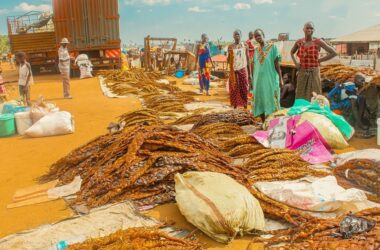
By Ochaya Jackson
The Bank of South Sudan has lowered its interest rate from 13 percent to 10 percent in what it called the additional measures by the bank to mitigate negative impacts of COVID-19 pandemic on the country economy. The change in the policy was availed on Monday 6th July 2020 by the Bank’s Governor, Gamal Abdalla Wani, during press conference held at the Bank’s Headquarters in the capital Juba.
“The downward revision of the Central Bank Interest Rate (CBR) to 10 percent is meant to reduce the overall cost of financing extended to private sector by commercial banks. Affordable loans will benefit business and South Sudanese citizens alike at this time of crisis. In addition, low CBR will also reduce the overall cost of finance at the domestic market. It will lower the cost of Certificates of Term Deposits (CTD) and Reverse Repos issued by the central bank,” the statement reads in part.
This comes as the Bank of South Sudan’s Monetary Policy Committee in an extraordinary meeting on the 3rd July, agreed to consider processes to ease hostile effects of the COVID-19 disease on the country’s financial systems, and banking sector specifically.
According to Gamal Abdalla Wani, the measures introduced in March 2020, did not work that is why they are considering additional monetary policy actions to improve the economy. And he argued that the measures are intended to provide greater security to secure the financial systems, cushion commercial banks by availing adequate liquidity, to protect business enterprises [micro, small and medium enterprises] and members of society. He added that the measures are also intended to create favourable conditions for swift economic recovery, once the pandemic comes to an end.
Besides, there are also monetary policy measures the central bank is considering, which include; reduction of Cash Reserve Ratio (CRR) from 15% to 10%. It said its intention is relief extra liquidity to commercial banks and to support economic activities [micro and small enterprise] hardest hit by the pandemic.
Suspension of Minimum paid Up Capital Regulation Amended 2020, which suspends Circular No. SDR/S/4/2020 that directs all banks to raise their paid up capital to minimum of 5 billion South Sudanese pounds for a period of six months, it is said the measure is taken to protect the financial sector and prevent potential risk of banking crisis.
South Sudanese Pound as Legal Tender, should be accepted in payment of all public and private debts in the country; pursuant to this, it said the bank issued number of circulars including the Banking Circular Number BSS/3/2015 dated 14th Dec, 2015, instructing all government agencies, Financial Institutions, NGOs, Civil Societies Organization and the general public, to use the SSP in all their financial transactions.
And, restructuring of loans in which it said the central bank anticipates customers with huge amount of loans would face challenges in servicing their loans, thus creating liquidity problems to the banks. It also said the banks are allowed to engage their customers and renegotiate terms especially those with outstanding loans facing temporary cash flow challenges arising from the pandemic.
On the other hand, the Bank’s Governor Gamal Abdalla, said the central bank of South Sudan should be empowered to buy enough crude gold, and that President Salva Kiir has authorized 4 million dollars to be released by the Ministry of Finance, and also the Bank’s Board has approved 1.5 million dollars all totalling to 5.5 million dollars.
And, according to him, the gold is going to be bought in local currency in order to strengthen the country’s weak pound and it will give the government free hand borrow money from outside in which he said it will give the government leverage.


